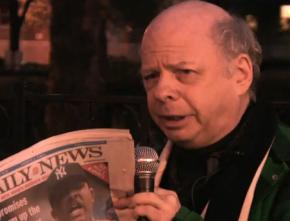Made to look terrifying
After close to four years behind bars, much of it in solitary confinement, Syed Fahad Hashmi agreed to a deal in which he pled guilty to a single count of terrorism. He will spend as much as a decade more in prison. His crime? An acquaintance who stayed with him while he lived in Britain was carrying ponchos and waterproof socks that allegedly ended up with al-Qaeda.
Fahad was due to go on trial where he hoped his innocence would be shown. But he endured for years a slander campaign by U.S. officials and the media, and the judge in his trial had issued a series of negative rulings, such as agreeing to the prosecution’s request for an anonymous jury.
Among Fahad’s dedicated supporters are and . Shawn is a well-known actor and playwright, and author, most recently, of Essays from Haymarket Books. Eisenberg is a writer and actor whose Collected Stories of Deborah Eisenberg is newly published by Picador.
They issued this statement on May 3 at one of the regular vigils for Fahad held outside the Metropolitan Correctional Center in New York City.
IT’S OBVIOUSLY not irrational for Americans to be afraid of terrorist attacks or to try to prevent them. But if we don’t arrive at a rational approach to dealing with the threat of such attacks, we will find ourselves falling to the lowest levels of a police state with the speed of an elevator whose cables have snapped.
At the start and at the finish of the Hashmi case, tricks of the theatre have been used to make a human being look terrifying to an audience. By the extreme conditions in which he was restrained, he was made to seem like a dangerous animal, so ferocious that only the tightest and thickest chains could prevent him from eating us alive.
By the layers of isolation which kept him from communicating with the outside world, his words were made to seem so poisonous, so hateful and powerful, that if they could be heard they would knock down walls and devastate cities. And at the end, the protection accorded to those who would determine his innocence or guilt made it appear that he belonged to a movement so vast and so mighty that it had more power than the greatest criminal gangs to strike down its enemies wherever they might hide.

In the face of these frenzied theatrical devices, which not only presume the guilt of the defendant but scream it out across the public square, it’s hardly surprising that the defendant has lost faith that our system of justice is really based on the presumption of innocence, and it’s certainly not surprising that, faced therefore with trying to prove a negative (that he is NOT a terrorist), he has decided to withdraw his claim of innocence.
Meanwhile, down the street, the criminals of high finance, who have undoubtedly caused the suffering and even the death of countless human beings, go unpunished and instead are rewarded with prizes of untold wealth.


